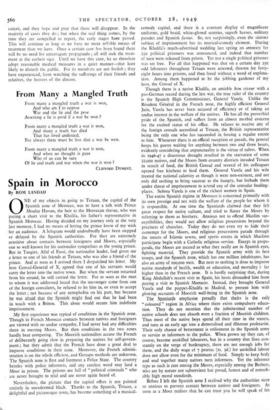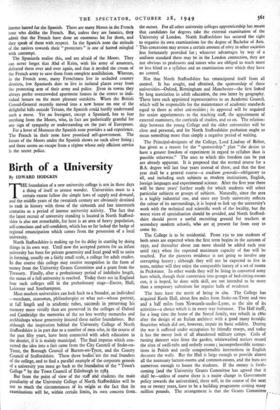Spain in Morocco 1L1 ROM LANDAU O NE of my objects
in going to Tetuan, the capital of the Spanish zone of Morocco, was to have a talk with Prince Moulay Hassan, the heir to the Moroccan throne, who was paying a short visit to the Khalifa, his father's representative in Spanish Morocco. Having decided on my journey only at the very last moment, I had no means of letting the prince know of my wish -for an audience. A 'telegram would undoubtedly have been stopped or delayed by the Spanish authorities. For they arc extremely sensitive about contacts between foreigners and Moors, especially one so well known for his nationalist sympathies as the young prince. But in Tangier, Allal el Fassi, the nationalist leader, had given me a letter to one of his friends at Tetuan, who was also a friend of the prince. And as soon as I arrived there I despatched his letter. My host Consul-General of X, agreed that one of his servants would carry the letter into the native town. But when the servant returned from his errand, he still carried the letter. For as soon as the man to whom it was addressed heard that the messenger came from one of the foreign consulates, he refused to let him in, or even to accept the letter ; not because of any xenophobia on his part, but because he was afraid that the Spanish might find out that he had been in touch with a Briton. This alone would secure him indefinite imprisonment.
My first experience was typical of conditions in the Spanish zone. Though in French Morocco contacts between natives and foreigners are viewed with no undue sympathy, I had never had any difficulties there in meeting Moors. But then conditions in the two zones hardly bear comparing. The Moorish nationalists accuse the French of deliberately going slow in preparing the natives for self-govern- ment ; but they admit that the French have done a great deal to improve conditions in their zone. Moreover, the French admini- stration is on the whole efficient, and Gestapo methods are unknown. The Spanish zone is first and foremost a Police State. The country bristles with police, informers, and any careless word may land a Moor in prison. The prisons are full of " political criminals " who are never brought to trial and are never again heard of.
Nevertheless, the picture that the capital offers is not painted entirely in unredeemed black. Thanks to the Spanish, Tetuan, a delightful and picturesque town, has become something of a musical- comedy capital, and there is a constant display of magnificent uniforms, gold braid, white-gloved sentries, superb horses, military parades and Spanish fiestas. So, not surprisingly, even the sinister subject of imprisonment has its musical-comedy element. During the Khalifa's much-advertised wedding last spring an amnesty for 250 political prisoners was announced, and indeed that number of men were released from prison. Yet not a single political prisoner was set free. For all that happened was that on a certain day 250 odd labourers throughout Tetuan were arrested, thrown for forty- eight hours into prisons, and then freed without a word of explana- tion. Among them happened to be the jobbing gardener of my host, the Consul of X.
Though there is a native Khalifa, an amiable bon viveur with a pro-German record during the last war, the true ruler of the country is the Spanish High Commissioner, General Varela. Unlike the Resident General in the French zone, the highly efficient General Juin, Varela has never been accused of efficiency or of taking an undue interest in the welfare of the natives. He has all the proverbial pride of the. Spanish, and suffers from an almost morbid concern for the exalted status of his office. He refuses to. receive any of the foreign consuls accredited at Tetuan,. the British representative being the only one who has succeeded in forcing a regular entree to him. Whenever there is an official reception or parade, the general keeps his guests waiting for anything between two and three hours, evidently considering that unpunctuality is the virtue of rulers. When in 1946-47 a disastrous drought resulted in the starvation of some 22,000 natives, and the Moors from country districts invaded Tetuan in search of food, the British Consul and several of his colleagues opened free kitchens to feed them. General Varela and his wife treated the national calamity as though it were non-existent, and not only did nothing to bring succour to the hungry, but forbade them under threat of imprisonment to a:rend any of the consular feeding- places. Sefiora Varela is one of the richest women in Spain.
The entire Spanish regime in Morocco is concerned primarily with its own prestige and not with the welfare of the people for whom it is responsible. At one time the Spaniards claimed that they felt great respect for native culture, and tried to flatter the Moors by referring to them as brothers. Anxious not to offend Muslim sus- ceptibilities, they would not allow religious processions beyond the precincts of churches. Today they do not even try to hide their contempt for the Moors, and religious processions parade through the streets of Islamic towns, and sports events in which Muslims participate begin with a Catholic religious service. Except in propa- ganda, the Moors are treated as what they really are in Spanish eyes, fighting material. They provide the Spanish army with its best troops, and the Spanish zone, which has one million inhabitants, has also an army of roo,000 men. But next to nothing is done to improve native standards of health, wealth or education, and mortality i- far higher than in the French zone. It is hardly surprising that, during King Abdullah's recent visit to Spain, his hosts dissuaded him from paying a visit to Spanish Morocco. Instead, they brought General Varela and the puppet-Khalifa to Madrid, to present him with glowing accounts of Moorish well-being in the Spanish zone.
The Spaniards emphasise proudly that theirs is the only "coloured" region in Africa where there exists compulsory educa- tion. They do not mention that the infinitesimal number of native schools does not absorb even a fraction of Moorish children. Thus most of the native boys spend all their time in the streets, and turn at an early age into a demoralised and illiterate proletariat. Their only chance of betterment is enlistment in the Spanish army or service as informers to the police. When grown up they can, of course, become unskilled labourers, but in a country that lives con- stantly on the verge of bankruptcy, there are not enough jobs for them, and the daily wage of 7 pesetas (Is. 3d.) for unskilled labour does not allow even for the minimum of food. Simply to keep body and soul together many natives turn informers. Yet the informer type as such is rare among the Moors, especially among the Berbers, who are by nature not subservient but proud, honest and of remark- ably high moral standards.
Before I left the Spanish zone I realised why the authorities were so anxious to prevent contact between natives and foreigners. As soon as a Moor realises that he can trust you he will speak of his intense hatred for the Spanish. There are many Moors in the French zone who dislike the French. But, unless they arc fanatics, they admit that the French have done an enormous lot for them, and they speak of them with respect. In the Spanish zone the attitude of the natives towards their " protectors " is one of hatred mingled with contempt.
The Spaniards realise this, and are afraid of the Moors. They can never forget that Abd el Krim, with his army of amateurs, defeated them over and over again, and that it needed the cream of the French army to save them from complete annihilation. Whereas, in the French zone, many Frenchmen live in secluded country districts, few Spaniards dare to live in isolated places away from the protecting arm of their army and police. Even in towns they always prefer overcrowded apartment houses in the centre to indi- vidual houses on the more pleasant outskirts. When the British Consul-General recently moved into a new house on one of the delightful hills outside Tetuan, the Spanish could hardly understand such a move. Yet no foreigner, except a Spaniard, has to fear anything from the Moors, who, in fact are pathetically grateful for any sign of sympathy or understanding on the part of Europeans.
For a lover of Morocco the Spanish zone provides a sad experience. The French in their zone have promised self-government. The future of the Moors under the Spanish shows no such silver lining ; and there seems no escape from a regime whose only efficient service is the secret police.







































 Previous page
Previous page